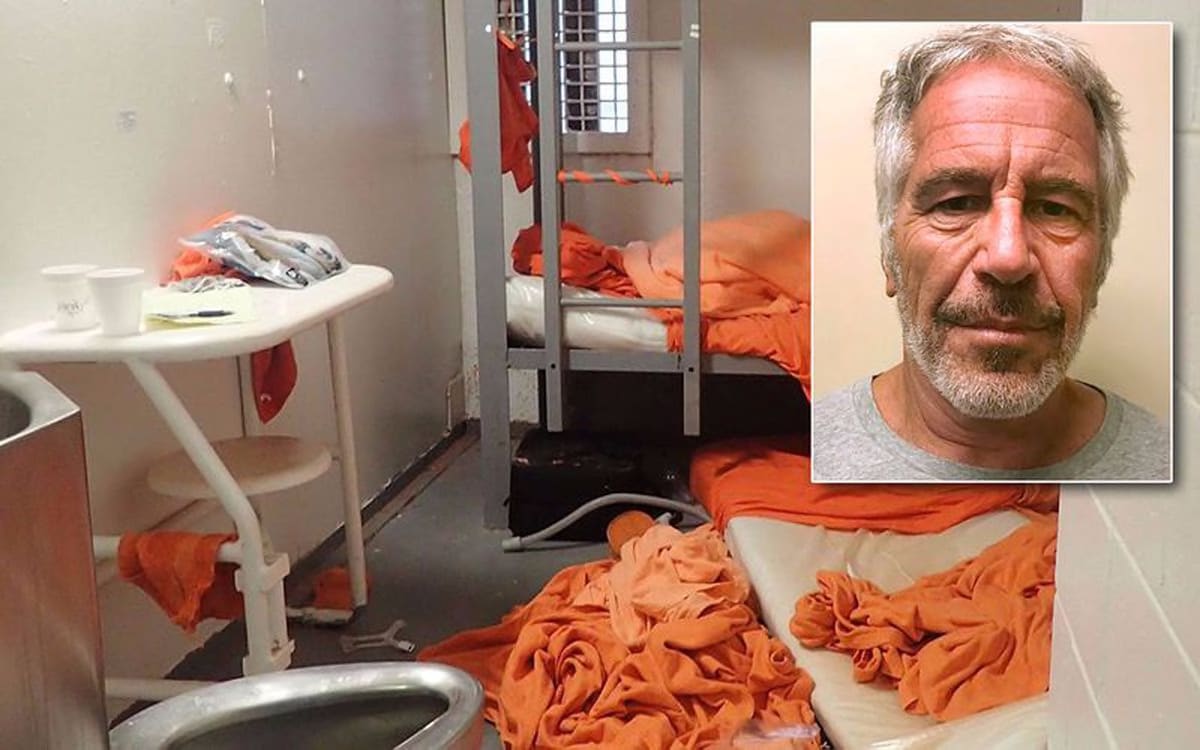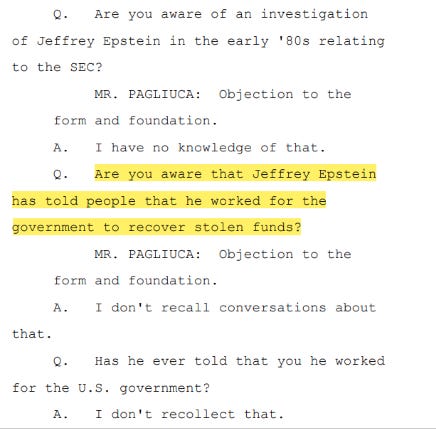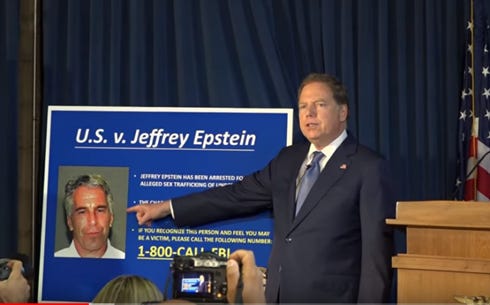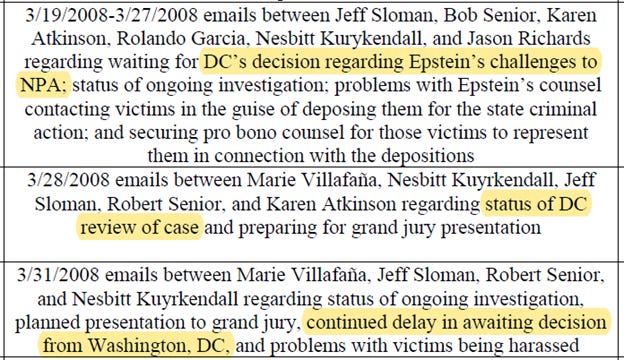They Knew Everything and Did Nothing
They Knew Everything and Did Nothing
Revisiting the DOJ efforts to protect Epstein
It has been two years since Jeffrey Epstein died.
I refuse to say he committed suicide because that would require trust in the DOJ’s investigation into his death. Not that it’s inconceivable that Epstein committed suicide. He was facing serious charges that would have resulted in serious time. He revised his will two days before he died. (Indicative of planning his death or being fearful he’d be killed, however you want to look at it.) Rather, it’s that we’ve learned from the Epstein saga that the DOJ, which serves the broader interests of the US government, can’t be trusted.
Two years gone and we still have no good answers about Jeffrey Epstein’s ties to intelligence.
There are sources telling Vicky Ward of Rolling Stone that “Epstein’s dealings in the arms world in the 1980s had led him to work for multiple governments, including the Israelis.” Ward’s sources said that Epstein “was known in the intelligence world as a ‘hyper-fixer,’ somebody who can go between different cultures and networks.”
As to the allegations that Epstein was dealing arms in the 1980s – if true, then likely in conjunction with US or Israeli intelligence – that might explain why he had an Austrian passport that was used to enter France, Spain, the United Kingdom, and Saudi Arabia in the 1980s.
And it’s easy to imagine Epstein being a “hyper-fixer” in the 1990s-2000s, given his ties to influential political and corporate figures. Think Bill Clinton, Bill Gates, and Leslie Wexner (of Victoria Secret’s fame), to name a few.
Adding to the intrigue is this excerpt we reported from Ghislaine Maxwell’s deposition, where Epstein had reportedly told people he worked for the US government to “recover stolen funds.”
One can’t help but think it all goes deeper than this, with intelligence relationships and handling agents and the US government either supporting or turning a blind eye to Epstein’s depravity because he was useful. There has to be something else. Yet without concrete specifics, and with a government unwilling to provide answers, these allegations remain unproven.
What they knew.
In July 2019, prosecutors with the US Attorney’s Office for the Southern District of New York (SDNY) held a press conference announcing the arrest and indictment against Epstein for sexual exploitation of minors from 2002 through 2005.
In explaining the SDNY’s decision to prosecute Epstein, US Attorney Geoffrey Berman stated they were “assisted from some excellent investigative journalism.”
If only that were true.
In reality, this was federal prosecutors in New York cleaning up the mess left behind by federal prosecutors in South Florida and federal officials in DC. Make no mistake: the 2019 decision to prosecute Epstein was the result of public outrage from Epstein’s 2007 federal non-prosecution agreement. Public relations got so bad the DOJ had to do something.
Background.
A couple dates to keep in mind. First, Epstein signed his non-prosecution agreement (NPA) with federal officials in September 2007. He pleaded guilty to Florida state charges in June 2008.
The Evidence.
The evidence to prosecute Epstein was always there. In 2015, during a South Florida civil case brought by Epstein’s victims against the federal government, it was revealed through privilege logs (summaries of the evidence the government was keeping secret) that the DOJ and FBI boxes and boxes of evidence against Epstein. This included an FBI filed called “Summary of Sexual Activity,” which contained information on victims, grand jury evidence, and travel records.
The Feds also had volumes of information on Epstein’s corporations and bank accounts.
Here’s where the dates matter. Epstein signed his federal non-prosecution agreement with DOJ officials on September 24, 2007. Court documents revealed that the investigation of Epstein was ongoing – not completed, not finished, but ongoing – at the time that document was signed.
In fact, the FBI was still interviewing witnesses after the non-prosecution agreement was signed. (It is standard practice for federal prosecutors offer a plea deal after they identify the victims – not before.)
For example, court filings indicate that “In October 2007, after the NPA was signed, federal agents spoke with three of the more than 30 identified victims.”
Approximately four months after Epstein signed the NPA, the FBI met with a victim and gathered “additional details about Epstein’s abuse as well as the direct sexual abuse by one of his co-conspirators, Nadia Marcinkova – who participated in the abuse of other victims as well.” (Unfortunately for the victims, Ms. Marcinkova was protected from prosecution by the Epstein NPA.)
As to victims in New York, privilege logs show the FBI/DOJ knew of these victims dating back to 2008.
It went all the way up to the top.
According to Epstein attorney Alan Dershowitz, the federal non-prosecution agreement “went through numerous levels of approval at main justice.” This means DC.
Our own research confirms what Dershowitz says. Andrew Oosterbaan, then-DOJ Chief of the Criminal Division’s Child Exploitation and Obscenity Section, was advised of plea negotiations and the non-prosecution agreement.
Main Justice official Andy Lourie was also involved. (Lourie was the acting chief of the Public Integrity Section of the Criminal Division in Washington in 2006, before becoming the acting principal deputy assistant attorney general and chief of staff to the Criminal Division by 2007. In 2007, he was also an assistant U.S. attorney in the Southern District of Florida.)
In early 2008, as there were discussions of a renewed federal plea agreement and concerns about press coverage, the FBI was involved in Epstein meetings in DC. This is consistent with the involvement of Main Justice in some of the most important aspects of the Epstein matter, from reviewing the non-prosecution agreement to apparently delaying the development of the case.
Main Justice was even blamed for the delay in presenting the Epstein case to a grand jury.
Eventually, in Spring 2008, DC would sign-off on the Epstein deal.
Main Justice assisting Epstein’s attorneys.
As prosecutors in South Florida consulted with Main Justice in DC, so too did Epstein’s lawyers.
Ken Starr, one of Epstein’s lawyers, had requested meetings with Assistant Attorney General Alice Fisher to stop the DOJ from executing its lawful duty and notifying Epstein’s victims of the plea deal.
These appeals worked. According to April 2008 correspondence from Starr to Deputy Assistant Attorney General Sigal Mandelker, the victim notification letters were “halted by an eleventh hour appeal to AAG Fisher.”
These victim notification letters, which would inform them of Epstein’s plea deal and afford them the right to be heard at any plea or sentencing hearing, were rights conferred by the Crime Victims’ Rights Act. The upper levels of the DOJ, in conjunction with local prosecutors and Epstein’s defense team, conspired to deny these rights.
As the 11th Circuit Court of Appeals recently observed, “it appears that prosecutors worked hand-in-hand with Epstein’s lawyers – or at the very least acceded to their requests – to keep the NPA’s existence and terms hidden from victims.”
I lay out this evidence – of prosecutors and federal officials fast-tracking the Epstein NPA, of reaching the NPA before victims were interviewed, of high level DOJ participation in the Epstein deal – because there’s one important question that remains unanswered:
Why did the federal government go to these lengths to protect Epstein and his co-conspirators?
We suspect the answer goes back to what we started with – Epstein’s ties to intelligence.
According to Alex Acosta, the former US Attorney who signed the NPA, he was instructed to back off the case because Epstein was above his pay grade. Acosta supposedly told Trump transition officials that “I was told Epstein ‘belonged to intelligence’ and to leave it alone.”
And who gave Acosta those instructions to leave Epstein alone? A good starting point might be those federal officials identified in this article.














Comments
Post a Comment